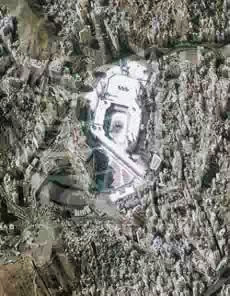The Elephant Raid
The King of Abyssinia )Ethiopia( had capturedYemenfor a very short
period. During the lifetime of 'Abdul-Muttalib,Yemenwas under the rule
of the King of Abyssinia. In those days Abrahah Ashram was the
governor ofYemenon behalf of the king. He built a temple inYemenand
persuaded the Arabs to perform Hajj at thetempleofYemeninstead of the
Ka'bah. However, he was not successful in his endeavor. In order to
put him to disgrace, an Arab defecated in the temple to desecrate it.
Abrahah grew so furious that he invaded Makkah with the intention of
destroying the Houseof Allaah -- the Ka'bah. He used elephants in his
attack, so the people of Makkah called them thePeople of the Elephant
and the year came to be known as the Year of the Elephant.
When the Quraysh came to know of the attack, they were filled with
fear, as they were no match for such a large and strong army. They
jointly requested their chief,'Abdul-Muttalib to go to Abrahah and
explore a way to avert the battle. When 'Abdul-Muttalib presented
himself to Abrahah, hewas greatly impressed and held him in high
esteem. 'Abdul-Muttalib stated that Abrahah's army had captured 200
camels, which belonged to him. Thereupon Abrahah remarked that he took
him to be a wise person but he obviously was mistaken. He
)'Abdul-Muttalib( was aware that Abrahah had come with the sole
purpose of demolishing the House of Allaah — the Ka'bah. However,
intentionally ignoring the topic, he only spoke of his camels instead
of saving the Ka'bah.
'Abdul-Muttalib said: " I am merely the owner of the camels, but this
House also has an Owner and He will save it."
The answer enraged Abrahah andhe burst out in anger saying he would
see if the Lord of the House would save it. His army was destroyed and
left like an empty field from which all the corn has been eaten up,
and only the straw with stalks and stubblewas left. The complete rout
of Abrahah's forces after 'Abdul Muttalib's daring reply was a
verysignificant event forArabia, which put great fear of Allaah in
their hearts.
After that fateful event, the rule ofYemenwent out of the hands of the
Abyssinian king and Sayf Ibn Dhi Yazin captured the country.
'Abdul-Muttalib took some nobles of Quraysh and went to congratulate
Sayf on his victory. Sayf Ibn Dhi Yazin gave 'Abdul-Muttalib glad
tidings that the last Prophet would be raised from his
)'Abdul-Muttalib's( offspring. This prophecy found wide currency and
fame. All the members of the delegation thought that the last Prophet
would be raised from their progeny. Each of them contacted the
soothsayers and monks hoping for good news but returned disappointed.
We have mentioned that 'Abdul-Muttalib invoked Allaah the Almighty
that in case he was granted ten sons, he would sacrifice one of them
in the nameof God. 'Abdul-Muttalib had ten sons, Al-Haarith,
Az-Zubayr, Abu Talib, 'Abdullaah, Hamzah, Abu Lahab, Ghidaq, Maqwam,
Safar and Al-'Abbaas. He also had six daughters, who were Umm
Al-Hakim, Barrah, 'Atikah, Safiya, Arwa and Omayma.
'Abdullaah was the father of Prophet Muhammad. His mother was Fatimah,
daughter of'Amr Ibn 'A'idh Ibn 'Imran Ibn Makhzum Ibn Yaqdha Ibn
Murrah.'Abdullaah was the most handsome of 'Abdul-Muttalib's sons, the
chastest and the most loved. He was also the son whomthe divination
arrows pointed at, to be slaughtered as a sacrifice toAl-Ka'bah. When
'Abdul-Muttalib had ten sons and they reached maturity, he revealed to
them hissecret vow which they silently and obediently accepted. Their
names were written on divination arrows and given to the guardian of
their most beloved goddess, Hubal.
The arrows were shuffled and drawn. An arrow showed that it was
'Abdullaah to be sacrificed. 'Abdul-Muttalib then took the boyto
Al-Ka'bah with a razor to slaughter the boy. Quraysh, his uncles from
Makhzoom tribe and his brother Abu Talib, however, tried to dissuade
him from consummating his purpose. Aftermuch discussion they turned to
Saja', a famous soothsayer. She pointed out that blood money fortheir
)'Abdul-Muttalib's( clan was ten camels. Thus, they should
put'Abdullaah on one side and ten camels on the other and then draw
the lots.
In case the camels were chosen they would be slaughtered, but
if'Abdullaah was chosen they should add ten more camels and draw
again. They should keep adding to the number of the camels until the
camels were drawn. This exercise went on until the number of camels
reached one hundred. 'Abdul-Muttalib drew the lots twice more for his
personal satisfaction, but each time it fill upon the camels. Hence,
100 camels were slaughtered and 'Abdullaah was saved. Since that time,
the blood money of a person who was killed was fixed at one hundred
camels.
'Abdul-Muttalib chose Aaminah, daughter of Wahab Ibn 'Abd Munaaf Ibn
Zahrah Ibn Kilaab, as a wife for his son, 'Abdullaah. In the light of
this ancestral lineage,she stood eminent in respect of nobility of
position and descent. Her father was the chief of Bani Zahrah, to whom
great honor was attributed. They were married in Makkah, and soon
after 'Abdullaah was sent by his father to buy dates in Madeenah where
he died. According to another version, 'Abdullaah went toSyriaon a
trade journey and died in Al-Madeenah on his way back. He was buried
in the house of An-Nabigha Al-Ju'di. He was twenty-five years old when
he died. Most historians state that his death was two months before
the birth of Prophet Muhammad. Some others said that his death was two
months after the Prophet's birth. When Aaminah was informed of her
husband's death, she composed a heart-rending elegy in his memory.
'Abdullaah left very little wealth --five camels, a small number of
goats, a woman servant called Barakah Umm Ayman, who would later
serve as the Prophet's nursemaid.

No comments:
Post a Comment